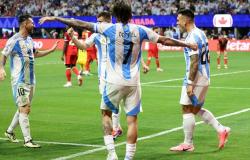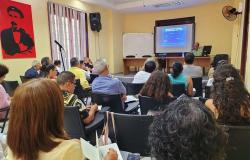Just as she appears in the photos, petite, almost light, Marina is in the treatment. Her kindness resists, and even overcomes, that scratchy, impersonal quality of electronic communication. She draws from the arts and knowledge as if from an immense source, with the thirst to understand life, or at least try to.
To talk about theater, he turns to the Argentine poet Juana Bignozzi, a supporter of “a poetry that transcends, that accompanies, that protects someone in a difficult moment, that gives them the necessary strength to, for example, take over the Winter Palace. “I don’t know if I can write theater as powerful as Juana’s poetry, but I do recognize myself in that search, those questions, those attempts.”
Argentinian Marina Jurberg (1981) is an author, theater director and researcher, performer and teacher. Her work The Skin of the Earth unanimously won the Casa de las Américas Award, in the theater section, this year. Regarding this award, she spoke with Granma.
«In The Skin… I try to problematize motherhood as an experience, as an institution and as a portal to human sexuality, in a broad sense. From fiction I question the reason for so many interventions and power struggles brought into play in those instances of life.
«The universe of women occupies a central place in the work: it is warp, weave and design. But I believe that it is not a “feminine” work or “about the universe of women”, to the extent that the origin of all life is intrinsically interwoven with a maternal body.
According to the opinion of the Casa jury, Marina’s text discards “the conventions of the tradition of theatrical literature”; something that is not punctual, because as she herself recognizes, she has been obsessed with rethinking some notions of traditional dramaturgy for many years; in particular, those of structure and dramatic conflict.
«I observed that they were hegemonic notions that did not always match all types of sensibilities and textualities, that they were often required or compelled to “fit” into some molds.
«I am currently investigating these notions in more detail in my Master’s thesis in Dramaturgy, and I postulate the concept of “map” that can be fertile when approaching the form of a theatrical work (thinking about the “form” distinguishing it from “content” or differentiating poetic procedures vs. formal procedures).
–What is the theater that you want to write, do and enjoy?
–The theater that challenges me as a spectator is one that on the one hand sensitizes me, moves me, and on the other hand generates questions, interrogations; which allows me to think about my daily life, my connections, my projects, and in a broader sense, reality: the political, economic, cultural, symbolic context.
«The theater is for me like a hug, like a place to return to. It has two conditions to happen, which are what make it powerful and revolutionary: there must be a meeting, first between actors, actresses, directors and producing artists in general, and then between artists and the public; and there is copresence: the work of art only takes place to the extent that the bodies share the same space.
«In the theater that I want to write and do, I believe that there is something linked to art objects that can install questions that encourage critical thinking and enable transformation.»
–As a creator, what does teaching give you?
–In general, I tend to write much more within the framework of a workshop or academic training than when I don’t go to any educational space. For me, the encounter with other people is very enriching: seeing other people’s creative processes, being able to put oneself in the shoes of others, and reflect from poetics that are not my own.
As a teacher, in addition, it seems essential to continue studying, and allow yourself to be traversed by the abysses that learning entails. “Being an ‘eternal student’ doesn’t get good press, but I try to see it another way: always being in a learning situation can also be liberating.”
Inescapable, the topic of feminism occupied part of the exchange with Marina: «It went through me and goes through all my practices and perspectives: as a woman, friend, mother, artist, daughter, teacher, activist. It is a position from which to build a more just reality, from which to rethink violence and abuse in a broad sense.
«It allowed me to create, find and encounter myself and others, to dive into my own poetics; “It operated as a trigger or allowed a dialogue with creativity and production that was previously more blocked.”
In one way or another everything comes together in the word, in language as a desacralizing instrument: “Writing allows me to understand but also to change, to project myself, to become rebellious and to be able to take a few steps to the world we dream of.”






